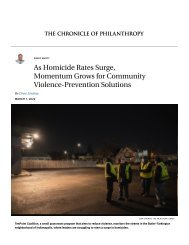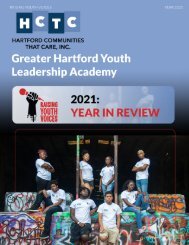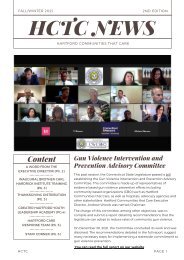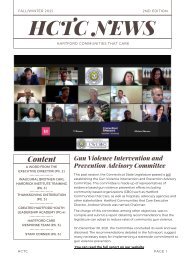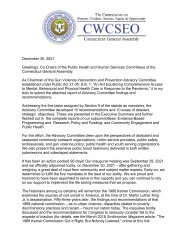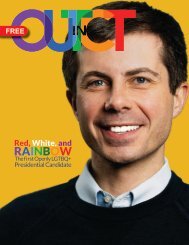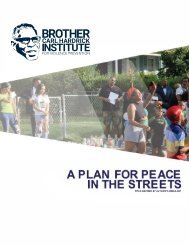OUTINCT2019
You also want an ePaper? Increase the reach of your titles
YUMPU automatically turns print PDFs into web optimized ePapers that Google loves.
• LGBT elders are twice as more likely<br />
to age alone and four times less likely<br />
to have children than older heterosexual<br />
adults.<br />
• Research suggests older adults who<br />
are socially isolated experience cognitive<br />
decline and are at risk for more<br />
medical and mental health complications.<br />
Nearly 60 percent of LGBT<br />
older adults report feeling a lack of<br />
companionship; over 50 percent reported<br />
feeling isolated from others.<br />
• Older LGBT adults are more likely to<br />
become caregivers than those who<br />
are heterosexual. Twenty-one percent<br />
of LGBT elders have provided care to<br />
friends, while only 6 percent of older<br />
heterosexual adults have done so.<br />
• About 20 percent of LGBT people<br />
avoid medical care out of fear of<br />
discrimination. Nearly one-third of<br />
transgender people do not have a<br />
regular doctor and 50 percent have<br />
taught their medical providers about<br />
transgender care.<br />
The LGBT Aging Center published a survey to<br />
capture the opinions and experiences of LGBT elders<br />
in long-term care facilities. The results from the<br />
769 respondents – ranging from people who identified<br />
themselves as LGBT adults, family members or<br />
friends, and people in the industry – are very telling.<br />
Nearly 90 percent predicted staff would discriminate<br />
against an LGBT elder who was living openly. Unfortunately,<br />
the feeling isn’t just with staff as a majority<br />
felt other residents would discriminate (81 percent) or<br />
isolate (77 percent) an LGBT resident.<br />
Because discrimination is unacceptable and<br />
because we are committed to making Connecticut<br />
a great place to live and age for everyone, AARP<br />
Connecticut utilizes this moving film as a tool to<br />
generate an open dialogue in communities across the<br />
state. We hold discussions at the conclusion of the<br />
film at every event where attendees are encouraged<br />
to get involved with their own reaction to the film and<br />
questions.<br />
“The University of Saint Joseph Department of Social<br />
Work and Equitable Community Practice prepare<br />
social workers who are appreciative of diversity in its<br />
many forms,” said Raymie Wayne, Saint Joseph professor<br />
and department chair. “Gen Silent is a poignant<br />
film that demonstrates the concept of intersectionality,<br />
such as how our multiple identities can overlap,<br />
and the complexities of aging and navigating healthcare<br />
systems – all of which are important lessons<br />
for aspiring social workers. Practitioners with raised<br />
awareness of clients’ potential identities and vulnerabilities<br />
will be more prepared to create safe spaces<br />
for all and to provide advocacy when needed.”<br />
We want to be a part of your community and<br />
welcome any suggestions, feedback and invitations<br />
to participate in organized events we may not be<br />
aware of quite yet. If you are interested in bringing<br />
free AARP programs, such as a showing of Gen<br />
Silent, to your community please contact us at<br />
ctaarp@aarp.org.<br />
There are also many ways for people get involved<br />
in helping their community and supporting<br />
our advocacy efforts by becoming an AARP volunteer.<br />
Through education, advocacy and service, an<br />
AARP Connecticut team of nearly 800 volunteers<br />
have the opportunity to share the lessons of their<br />
life experiences; benefit from high-quality training<br />
and education; enjoy stimulating challenges and<br />
meet new people; and know that they are truly<br />
making a difference.<br />
Visit www.aarp.org/volunteer to learn more<br />
about the different programs and contact Elaine<br />
Werner at ewerner@aarp.org or 860-548-3169 to<br />
inquire about how you can share your experiences<br />
through volunteering.<br />
You can help in a variety of ways, such as:<br />
• Become a volunteer<br />
• Become an advocate<br />
• Sign up to become an AARP activist,<br />
and you’ll receive e-newsletters,<br />
email action alerts on the issues you<br />
care about, and the latest news from<br />
the General Assembly, Congress and<br />
the White House.<br />
Stay informed and join the conversation:<br />
• Get the latest local news and information<br />
from AARP at www.aarp.org/ct<br />
• Facebook: AARPCT<br />
• Twitter: @AARPCT<br />
LGBTQ+ GUIDE OF CT | 33





